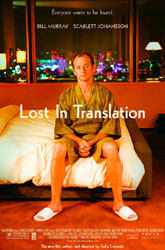 Director: Starring: Release: 12 Sep. 03
|
Lost in Translation BY: DAVID PERRY Sofia Coppola’s Lost in Translation is about being lost in various worlds of alienation. The most recognizable is the Tokyo setting for the film, but that geographic distancing is merely the tip of the iceberg, a guffaw-strewn set piece that serves more as a supporting player than as the untranslatable to the leads in the film. Where the characters of Lost in Translation fail to fully free themselves from isn't some far off place; it is the impossible escape from their own skins. They have gone through an existence of fairly acceptable achievement but find that there isn’t necessarily a nexus for them. They work to find some bond, not just between each other but within themselves, that might make conversion at least possible. The magic of the film is that, in recognizing the impossibility of such a deed, they come close to achieving it. There is a romantic vibe to all this, but Coppola rightly chooses to underplay it. The May-December theatrics that could have transgressed throughout Lost in Translation would have nearly ruined a movie that thrives on the paramount meaning of emotional bonds above carnal bonds. These characters are together out of a shared worldview and a liking towards each other. For them to share anything more than a chaste late night watching TV in the same bed would have set the film back. It’s like David Lean’s Brief Encounter set solely at the train station -- their love is built on the moment of togetherness, not the possibilities of a future nor the mere satisfaction of sex. It is one of the most maturely made romantic films ever made. Coming off a delicacy beyond anyone’s expectations with her first feature, The Virgin Suicides, Sofia Coppola proves that she is more than a bad actress from an amazing filmmaking family (although father Francis Ford Coppola is best known, her mother Eleanor is also recognized for her filmmaking abilities -- brother Roman also made his film debut with last year’s kitsch-cool CQ). Coppola has a maternal touch on her films, treating them with a love and devotion unmatched in her contemporaries. But recognizing her talents from merely a feminine attribute is to look over her striking understanding of more than just femininity but throughout humanity. The Virgin Suicides might, at first glance, seem like a movie about the girls, but it is retrospectively about the boys and their inability to understand their own emotions about the Lisbon sisters. Again, Coppola’s grasp of the characters comes in more than just a recognition of its female form, the character of Charlotte (Johansson), but also in her striking realization of the male form, Bob (Murray; in the best performance of his career other than Herman Blume in Rushmore). Their chance meeting in Tokyo, two people unable to fully grasp the hedonism of the rest of America’s tourists, comes with the understanding that they are alike in every way but age and gender. Although age is certainly a setback in what might be more than a plutonic relationship, 25-year-old Charlotte comes with maturity comparable to her 55-year-old friend. They share Tokyo when no one else can. This
is not because Charlotte’s hotshot photographer husband John (Ribisi;
bearing an odd resemblance to Coppola’s husband Spike Jonze, a
characterization that should make the Adaptation. director worry) is out
enjoying the city with other people; not because the hotel lounge is filled
with vacant, emotionless ciphers like the teenybopper actress Kelly (Faris);
not because Bob’s wife has become little more than a recognition of
domesticity, usually represented by a fax machine; not because the city’s
lights are so bright from the pachinko machines a faux Times Square
architecture that they cannot sleep. The reason Charlotte and Bob seem
perfect together is that they are both at a moment in life when nothing else
seems to make sense, no future seems perceptible -- him in a career slump,
midlife crisis, her trying to make sense of what to do with a Yale degree in
philosophy. They can share the mysteries of their lives, even if only for
this fleeting moment in Tokyo. |
|
| ©2003, David Perry, Cinema-Scene.com, 3 October 2003 | ||
